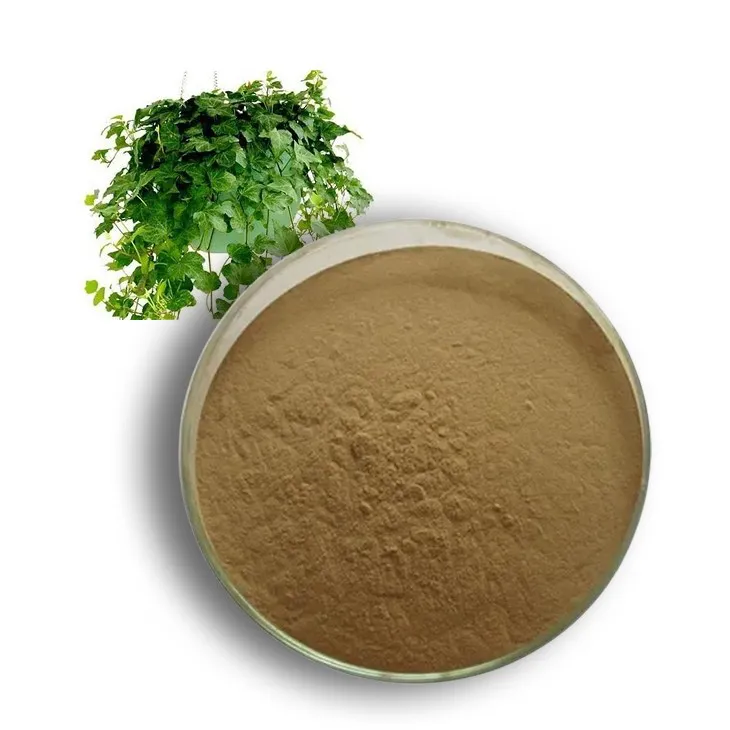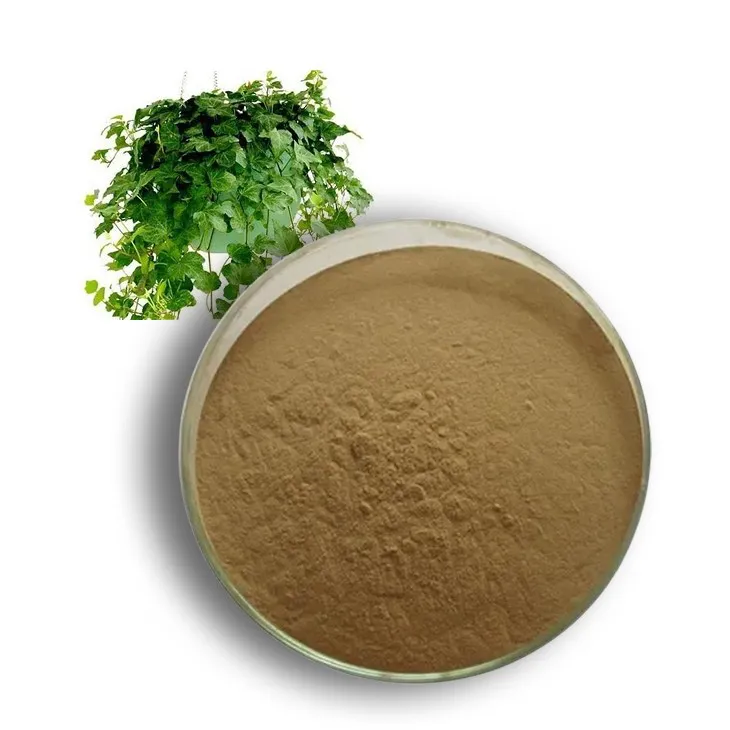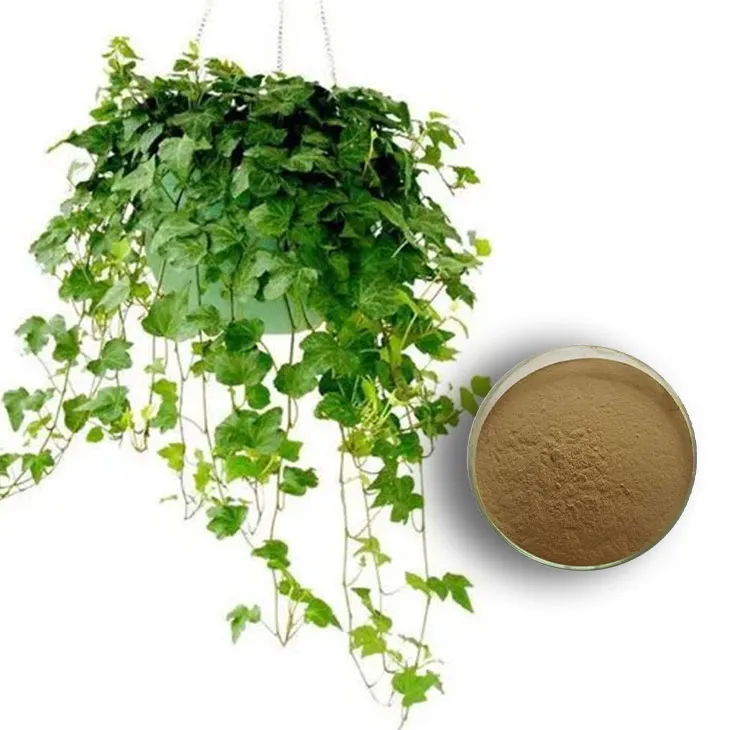- 0086-571-85302990
- sales@greenskybio.com
Ivy Extract: Components of Fertilizers and Feeds
2024-12-01

1. Introduction
The use of natural extracts in fertilizers and animal feeds has been on the rise in recent years. Ivy Extract is one such substance that has gained significant attention. Ivy Extract contains a plethora of components that can have a profound impact on soil health and animal nutrition.

2. Components of Ivy Extract
2.1. Organic Acids
Ivy extract is rich in organic acids such as citric acid and malic acid. These organic acids play a crucial role in soil enrichment. Citric acid, for example, helps in the chelation of metal ions in the soil. This chelation process makes essential nutrients like iron, zinc, and manganese more available to plants. In animal feeds, organic acids can also act as a natural preservative, inhibiting the growth of harmful bacteria. Moreover, they can improve the palatability of the feed, making it more appealing to animals.
2.2. Alkaloids
Alkaloids present in ivy extract are another important component. Although they are present in relatively small amounts, they can have significant effects. Some alkaloids may have antimicrobial properties. In the context of soil, this can help in controlling soil - borne pathogens. In animal feeds, these alkaloids might interact with the animal's digestive system in a way that could potentially enhance nutrient absorption. However, it is important to note that the presence of alkaloids also requires careful consideration as some alkaloids can be toxic in large quantities.
2.3. Polyphenols
Polyphenols are a major group of compounds in ivy extract. They are known for their antioxidant properties. In soil, polyphenols can contribute to the overall soil structure by interacting with soil particles. They can also affect the microbial community in the soil. In animal feeds, polyphenols can protect the feed from oxidative degradation, thereby maintaining its nutritional quality. Additionally, polyphenols may have positive effects on animal health, such as reducing inflammation in the animal's body.
2.4. Vitamins and Minerals
Ivy extract also contains certain vitamins and minerals. Vitamins like vitamin C can be beneficial for both plants and animals. In plants, vitamin C can act as an antioxidant and may also be involved in various physiological processes. In animals, it is essential for normal growth and development. Minerals such as potassium and calcium are also present in ivy extract. In soil, potassium is important for plant growth, especially for the development of strong stems and roots. In animal feeds, calcium is crucial for bone development and other physiological functions.

3. Significance for Soil Enrichment
3.1. Nutrient Availability
The components of ivy extract work together to enhance nutrient availability in the soil. As mentioned earlier, the organic acids chelate metal ions, making them more accessible to plants. This is especially important for micronutrients that are often present in the soil but in forms that are not easily absorbed by plants. For example, iron deficiency can lead to chlorosis in plants, but with the help of ivy extract, the iron can be made more available, preventing such nutrient - related disorders.
3.2. Soil Structure Improvement
Polyphenols and other components in ivy extract can improve soil structure. They can bind soil particles together, creating a more stable soil structure. This has several benefits. A well - structured soil has better water - holding capacity, which means that plants can access water more easily during dry periods. It also allows for better air circulation in the soil, which is essential for the roots to respire. Additionally, a good soil structure promotes the growth of beneficial soil microorganisms.
3.3. Microbial Activity
The presence of ivy extract in the soil can stimulate microbial activity. Microorganisms play a vital role in soil fertility. They are involved in processes such as decomposition of organic matter, nitrogen fixation, and nutrient cycling. Some components of ivy extract, like the organic acids and polyphenols, can serve as a food source for certain soil microorganisms. This can lead to an increase in their population and activity, which in turn benefits plant growth.

4. Significance for Animal Feed Quality
4.1. Nutritional Enhancement
Ivy extract can enhance the nutritional quality of animal feeds. The vitamins, minerals, and other beneficial components present in the extract can supplement the existing nutrients in the feed. For example, in livestock feeds, the addition of ivy extract can provide additional sources of essential vitamins and minerals that may be lacking in the base feed. This can lead to improved growth rates, better reproduction performance, and overall healthier animals.
4.2. Digestibility
Some components of ivy extract can improve the digestibility of animal feeds. The organic acids, for instance, can help in breaking down complex nutrients in the feed, making them more easily digestible for animals. This is particularly important for animals with relatively simple digestive systems, such as poultry. Improved digestibility means that animals can extract more nutrients from the feed, reducing the amount of feed required for optimal growth and production.
4.3. Health Promotion
The antioxidant properties of polyphenols in ivy extract can contribute to the health promotion of animals. Oxidative stress can be a problem in animals, especially those in intensive farming systems. By reducing oxidative stress, polyphenols can help in maintaining normal physiological functions, improving the animal's immune system, and reducing the incidence of diseases. Additionally, the antimicrobial properties of some components in the extract can help in controlling harmful bacteria in the animal's gut, further promoting animal health.
5. How Ivy Extract is Revolutionizing Nourishment
The unique properties and functions of ivy extract are indeed revolutionizing the way we nourish plants and animals. In the case of plants, it offers a more sustainable and natural way to improve soil fertility and plant growth. Instead of relying solely on synthetic fertilizers, which can have negative environmental impacts, ivy extract provides an alternative that is both environmentally friendly and effective. For animals, it provides a natural means to enhance feed quality and animal health, reducing the need for excessive use of antibiotics and other additives in animal feeds.
5.1. Environmental Sustainability
One of the major advantages of using ivy extract in fertilizers and feeds is its environmental sustainability. Ivy is a relatively abundant plant in many regions, and the extraction process can be carried out in a sustainable manner. Compared to the production of some synthetic fertilizers and additives, which require significant amounts of energy and can produce greenhouse gas emissions, the use of ivy extract is a more "green" option. Additionally, by improving soil health, it can contribute to carbon sequestration in the soil, further reducing the environmental impact.
5.2. Reducing Chemical Dependency
In both plant and animal nutrition, ivy extract can help in reducing the dependency on chemical inputs. In agriculture, reducing the use of synthetic fertilizers can prevent soil degradation and water pollution. In animal husbandry, reducing the use of antibiotics and chemical additives in feeds can help in addressing the issue of antibiotic resistance and improving the safety and quality of animal products. Ivy extract offers a natural and effective alternative that can gradually replace some of the chemical inputs currently in use.
6. Conclusion
In conclusion, ivy extract is a remarkable substance with a wide range of components that have significant implications for soil enrichment and animal feed quality. Its unique properties and functions are making it an increasingly important ingredient in fertilizers and feeds. As we continue to explore the potential of natural extracts, ivy extract stands out as a promising option for more sustainable and effective plant and animal nourishment. However, further research is still needed to fully understand all aspects of ivy extract and to optimize its use in different agricultural and animal husbandry applications.
FAQ:
What are the main components of ivy extract?
Ivy extract contains various components. It typically has organic compounds such as flavonoids, saponins, and alkaloids. These components contribute to its properties in fertilizers and animal feeds. Flavonoids, for example, can have antioxidant effects, while saponins may play a role in soil conditioning and nutrient uptake in plants. Alkaloids might also have certain physiological effects on animals when included in feeds.
How does ivy extract enrich the soil?
Ivy extract enriches the soil in multiple ways. The organic compounds present in it can improve soil structure. For instance, saponins can help in breaking up compacted soil, allowing better aeration and water infiltration. It also may contain nutrients like potassium, phosphorus, and nitrogen in small amounts or in forms that are more easily available to plants. Additionally, the microbial activity in the soil can be enhanced by the presence of the extract, which further aids in nutrient cycling and availability.
What is the significance of ivy extract in animal feed quality?
The significance of ivy extract in animal feed quality is notable. It can provide additional nutrients that may be lacking in regular feed. The antioxidant properties of flavonoids, for example, can help protect animals from oxidative stress. Also, certain components in the extract might improve digestion in animals. This could lead to better feed conversion ratios, meaning animals can gain weight more efficiently on the same amount of feed. Moreover, it may have antimicrobial properties that can help maintain the health of the animals by reducing the growth of harmful bacteria in the gut.
How is ivy extract revolutionizing plant nourishment?
Ivy extract is revolutionizing plant nourishment by offering a more natural and sustainable approach. Traditional fertilizers often rely on synthetic chemicals, while ivy extract provides a more organic alternative. It can enhance the overall health of plants, not just by providing nutrients but also by improving their resistance to pests and diseases. The soil - improving properties of the extract also contribute to better plant growth in the long - term. It can help plants establish stronger root systems, which in turn allows for better uptake of water and other nutrients from the soil.
What are the unique properties of ivy extract in fertilizers and feeds?
The unique properties of ivy extract in fertilizers and feeds are diverse. In fertilizers, its ability to enhance soil fertility in a more holistic way compared to synthetic products is a key property. It can also interact with soil microorganisms in a beneficial manner. In animal feeds, its combination of antioxidant, antimicrobial, and digestive - enhancing properties is unique. These properties work together to improve the overall well - being of animals, from their growth performance to their immune function.
Related literature
- The Role of Ivy Extract in Sustainable Agriculture"
- "Ivy Extract: A New Source of Nutrients for Animal Feeds"
- "Components of Ivy Extract and Their Impact on Soil Health"
- ▶ Hesperidin
- ▶ Citrus Bioflavonoids
- ▶ Plant Extract
- ▶ lycopene
- ▶ Diosmin
- ▶ Grape seed extract
- ▶ Sea buckthorn Juice Powder
- ▶ Fruit Juice Powder
- ▶ Hops Extract
- ▶ Artichoke Extract
- ▶ Mushroom extract
- ▶ Astaxanthin
- ▶ Green Tea Extract
- ▶ Curcumin
- ▶ Horse Chestnut Extract
- ▶ Other Product
- ▶ Boswellia Serrata Extract
- ▶ Resveratrol
- ▶ Marigold Extract
- ▶ Grape Leaf Extract
- ▶ New Product
- ▶ Aminolevulinic acid
- ▶ Cranberry Extract
- ▶ Red Yeast Rice
- ▶ Red Wine Extract
-
Lemon Balm Extract
2024-12-01
-
Kupilu Extract
2024-12-01
-
Baicalin
2024-12-01
-
Garcinia Cambogia Extract
2024-12-01
-
Lavender Extract
2024-12-01
-
Panax Ginseng Leaf Extract
2024-12-01
-
Polygonum multiflorum extract
2024-12-01
-
Wheat Germ Extract
2024-12-01
-
Aminolevulinic acid
2024-12-01
-
Carrageenan Extract Powder
2024-12-01





















